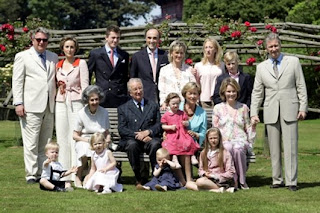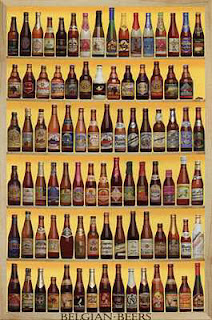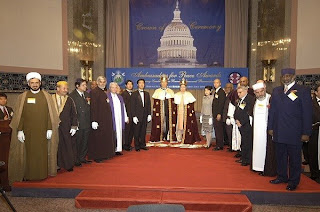 Belgium, to put it simply, is one of those accidents of history. Coming into existence only in 1830 (which makes it young by European standards), Belgium was before that briefly ruled by the Netherlands; but for most of the previous 400 years before independence, rule of Belgium was passed between Spain and Austria (don't ask me how two nations that are not even close to Belgium ended up ruling it) with France often invading trying to take it over. Before that, what is today Belgium was in the Middle Ages a collection of free towns and feudal domains that was a part of that great anomaly of history, the Holy Roman Empire (and if you want to go really far back, what is today Belgium was part of the Roman Empire, as the province of Belgica, from which the name Belgium comes from).
Belgium, to put it simply, is one of those accidents of history. Coming into existence only in 1830 (which makes it young by European standards), Belgium was before that briefly ruled by the Netherlands; but for most of the previous 400 years before independence, rule of Belgium was passed between Spain and Austria (don't ask me how two nations that are not even close to Belgium ended up ruling it) with France often invading trying to take it over. Before that, what is today Belgium was in the Middle Ages a collection of free towns and feudal domains that was a part of that great anomaly of history, the Holy Roman Empire (and if you want to go really far back, what is today Belgium was part of the Roman Empire, as the province of Belgica, from which the name Belgium comes from).When Belgium became an independent state in 1830, it did not have (and still does not have) a unifying language, ethnic group, or culture. In religion, it was a bit more unified with it being about 75% Catholic and 25% Protestant (the figures remain the same today, except the churches in present day Belgium are mostly empty on Sundays). The result of this is since independence, Belgium has been a strange political marriage between two ethnic groups, the Flemings and the Walloons. The Flemings live in the North and speak their own version of Dutch while the Walloons live in the South and speak their own version of French.

This family you see above is one of only three things that unites Belgium, the other two are its national soccer team (like the rest of Europe, Belgians are soccer mad) and its famous beer.
 If there is one thing Belgians really take pride in, its their beer. Without a doubt the best beer on the planet, Belgian beer is the result of centuries of perfection. Many of the brands of Belgian beer sold today, Hoegaarden, Stella Artois, Leffe, Dubbel and others are based on recipes going back to the Middle Ages (the recipe for Leffe actually goes back to the late 1100's). These beers and other Belgian beers has a quality that has such a richness in taste that few other beers can even come close to. Yes, it does take a little getting used to, but if you open your palate to the symphony of flavor that is the pride of Belgium, you too will soon be wondering how did you ever drink that standard watery crap that the FDA somehow allows to be called beer.
If there is one thing Belgians really take pride in, its their beer. Without a doubt the best beer on the planet, Belgian beer is the result of centuries of perfection. Many of the brands of Belgian beer sold today, Hoegaarden, Stella Artois, Leffe, Dubbel and others are based on recipes going back to the Middle Ages (the recipe for Leffe actually goes back to the late 1100's). These beers and other Belgian beers has a quality that has such a richness in taste that few other beers can even come close to. Yes, it does take a little getting used to, but if you open your palate to the symphony of flavor that is the pride of Belgium, you too will soon be wondering how did you ever drink that standard watery crap that the FDA somehow allows to be called beer.Of course in the world of Belgian beer, nothing beats Trappist Beer. Today, the Order of Cistercians of the Strict Observance, commonly referred to as the Trappists, allows only eight of their monasteries to market the beer they brew. Six of them are in Belgium and these six produce what is without a doubt the best beer brewed on Earth. In the United States Chimay is usually the easiest to get. Compared to the sewer water that you drank in high school and college, it is a bit expensive, but its worth every penny.
Now here is the best part. The Trappists (no way am I going to keep writing their formal name), follow the Rule of St Benedict (St Benedict was an Italian monk from the sixth century). In the Rule, St Benedict told generations of future monks that hard work is important as a service to God, and today the Trappists take it as the way to live. While most Belgian beer today is brewed in standard breweries, only using recipes that monks came up with 500-800 years ago, Trappist beer is still brewed in the monasteries by the monks themselves with little outside help. And all profits are used for the upkeep of the monasteries and the rest going to charities around the world. So next time you want to have a real beer and help out the unfortunate of the world, have a glass of Trappist beer.
So I'm sure you thinking, the nation that produces that most incredibly awesome beer brewed in the universe must be a happy nation. Well, unfortunately, no. Belgium is one of the most divided nations in Europe, divided into three different regions with two main ethnic groups. In the north is Flanders. Home to about 60% of the population, this Dutch speaking region is one of Europe's wealthiest regions, with its population having a better lifestyle than most Americans. In the south is Wallonia. Home to about 30% of Belgium's population. In this French speaking region, things aren't so great. In the 19th century, Wallonia was home of one of mainland Europe's most industrialized regions, but in the mid 20th century, the region became a rustbelt, very similar to the American Mid West, though lately it has been making a rebound. And then there is the last region of Belgium, home of the final 10% of the population, Brussels. Brussels, a French speaking (though officially bi-lingual) city in the Dutch speaking region, is one of the most modern and cosmopolitan cities in Europe today. Headquarters of the EU, home of many international corporations, and with a large multi ethnic population of professionals from around Europe as well as a vibrant community of African immigrants, Brussels is a city that many nations would love to have.
Since independence in 1830, the Flemings and the Walloons have been in a continual power play of give and take with power being balanced between the national government in Brussels and the two regional governments. In the 19th century, the Walloons, being more wealthy, dominated the national government, but allowed the Flemings to decide local policy in their region. In the 20th century (in which Belgium was overrun twice by Germany, in both WWI and WWII), the Flemings took over (and most of the prime ministers since have been Flemings), but in the process gave up more local power in order to please the Walloons. By 1990, Belgium had the distinction of being Europe's most divided nation - that's right even more divided than Northern Ireland and Bosnia.The Flemings and the Walloons almost never interact. In Northern Ireland, Catholics and Protestants (who have been shooting at each other for the past 300 years) have more interaction. In Bosnia, Serbs and Muslims (remember, just a decade ago they were slaughtering each other) have more interaction. Even Belgian politics reflected this division. Unlike most nations which usually has two or three main political parties, Belgium has a large collection of regional parties. In Flanders there are eight major political parties and in Wallonia there are five major political parties as well as a bunch of other minor parties. Belgium is one of those nations where you can have members of three or four or even five parties running the show. The result of this is Belgian governments are always a bizarre coalition of several parties, each one always trying to get a larger piece of the pie. Even Belgian media is divided, the TV and radio networks in Belgium are all localized.
So now comes the fun part of our account, the Elections of 2007.
In June 2007, Belgians went to the polls for what should had been routine (by Belgian standards) elections. Since 1999, the prime minister of Belgium was this man: Guy Verhofstadt
.jpg) By the way, this was most flattering picture I could find of Mr. Verhofstadt.
By the way, this was most flattering picture I could find of Mr. Verhofstadt.
From what I've gathered, it appears Verhofstadt ran Belgium in a Clintonesque centrist way, but without the scandals. After eight years in power, Belgian voters in both regions were tired with his coalition and the two main partners of his coalition, the VLD (Dutch speaking) and the Socialists (French speaking) suffered a huge set back at the polls - the VLD (a center left party) actually came in forth behind the far right Flemish Interests Party. The winners of the election were the CDV (Dutch speaking) and the Reform Movement (French speaking). Verhofstadt resigned as prime minister, and under Belgian law, King Albert named Verhofstadt head of the caretaker government while a new government was to form.
The honor of forming the new government as well as the prime ministership would go to this man, the head of the CDV, Yves Leterme
.jpg)
Now under normal circumstances, after a few weeks, a coalition between the CDV and Reform Movement (and perhaps one or two smaller parties) would had been established and Leterme would take over. Unfortunately, this time around, it didn't happen. Leterme had ran on a "give more power to the local regions" platform and Flemish voters voted for it in huge numbers. In Wallonia, both the Socialists and the Reform Movement both had a "more power to the national government" platform, and the Walloons voted for this in large numbers. The result of this platform split was deadlock occurred in the collation talks between the CDV and Reform Movement and other parties over how much power would go to Brussels and how much would go to the regions.
The deadlock continued for weeks
Then months
And into 2008
As of this was going on, a collective sense of embarrassment began to emerge in all three regions of Belgium. Belgians began to look at their nation and how divided it was and as the months dragged on without a government, the talk of a possible divorce of Belgium in the style of Czechoslovakia began to get louder. Suddenly, what had previously been laughed at was now being seriously discussed as a possible solution to the problem. Also, Guy Verhofstadt was still running the caretaker government, which under Belgian law really couldn't do anything. Even King Albert got involved, personally having the leaders of the main parties over at his estate for private closed door talks.
As of this went on, the rest of Europe watched very nervously. As the EU continues to gain more power, slowly turing Europe into a single Federated State, many EU supporters realized that if Belgium couldn't last after 180 years in existence, what chances does the EU have of turing Europe into a single state?
Finally in March of 2008, Leterme finally broke through and a government was finally formed. The new government included a large number of parties including the CDV, the Socialists, as well as nationalists parties from both regions. Though the government included parties from every part of the political spectrum, Belgians all across the region breathed a sign of relief as a new government led by Leterme was sworn in another round of elections would occur until 2011.
Then on July 14, Yves Leterme offered his resignation to King Albert. When Leterme was sworn in back in March, he vowed to get all enact his platform by July 15, and when July came and no power had been transferred to the regions (due to the French speaking parties blocking constitutional reform), Leterme announced his resignation. Belgians across the nation screamed in horror as another election could be in the near future. King Albert refused the resignation and asked Leterme to form a committee to try to solve the transfer of power problem. The committee is to report to the King on July 31. Meanwhile, a plan to redraw the electoral districts in Brussels is angering the people of Brussels because they are convinced its designed to give more power to the Flemish speakers. Things aren't looking so good for Belgium.
So what's in store in Belgium's future? No one knows, Belgium is already becoming the new Italy, with governments not lasting long and long disputed elections. Will Belgium split up? Will Belgium become a nation that exist in name only with all power belong to the regions? Or perhaps the French speaking parties could get their way and more power will go back to Brussels. Stay tune for what happens next.



